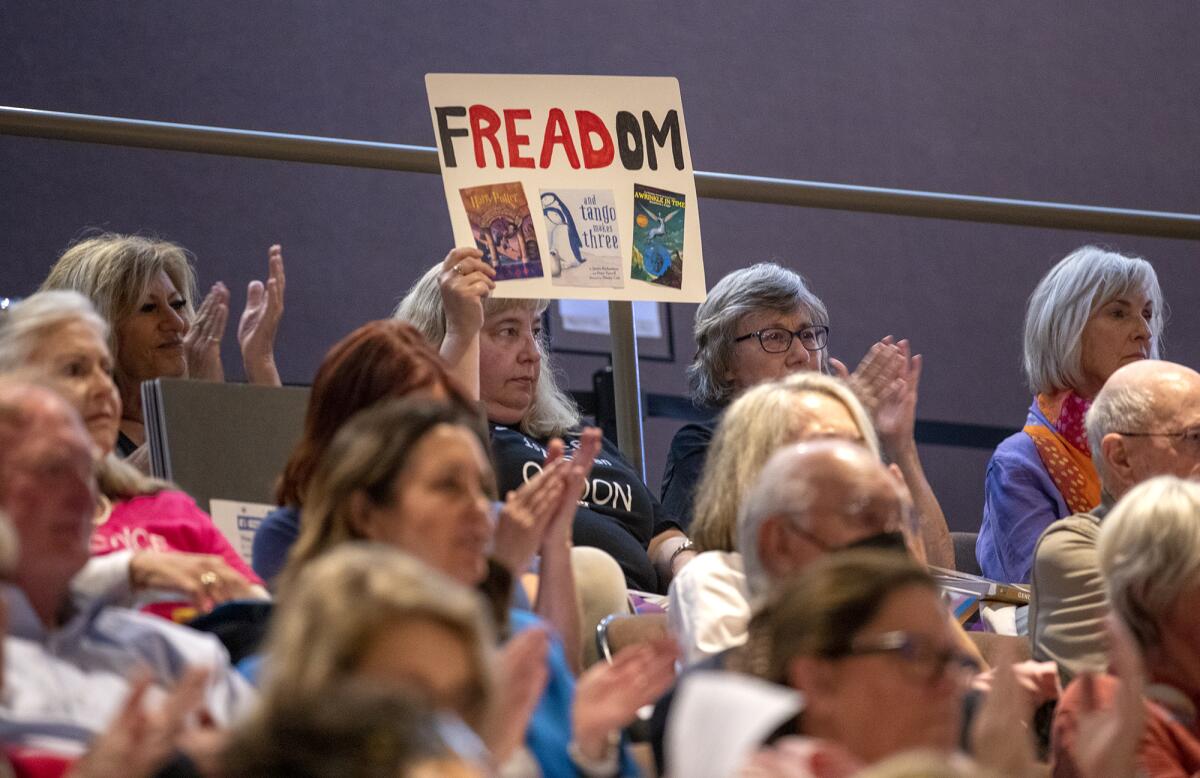Newsletter: A children’s librarian on why book bans are wrongheaded

- Share via
Good morning. I’m Kerry Cavanaugh, assistant editorial page editor, filling in this week for Paul Thornton. It is Saturday, Sept. 23. Let’s look back at the week in Opinion.
These are difficult days for America’s librarians, who’ve been dragged into the latest culture war battle — book bans. Public and school libraries are increasingly being targeted by conservative and “parental rights” groups that want to remove or restrict access to books they deem obscene or dangerous to young minds. In the first nine months of the year, the American Library Assn. tracked efforts to censor more than 1,900 books. That was a 20% increase over the same period in 2022, which had the highest number of challenges since the association began tracking censorship attempts 20 years ago. Most of the targeted books were written by or about a person of color or a member of the LGBTQ community.
The book censorship movement came to Huntington Beach over the summer, with the City Council voting to adopt a system that would rate certain books as obscene or inappropriate and ban anyone under 18 from accessing them without parental permission. That was too much for Barbara Richardson, who was a children’s librarian for the city’s public library for 32 years until she retired in 2020.
“I’ve never, not once, had anyone come up to me and say, ‘You know what, my child’s life was ruined because of a book they checked out from the library,’” Richardson said in the latest installment of The Times’ Hear Me Out video series based on letters sent by readers.
Of course no one has complained about being harmed by a library book. Book banning is about fearmongering and control over what other people are allowed to think. Such efforts to censor or restrict books must be deeply frustrating for librarians, who specialize in creating judgment-free spaces for people to read, explore and learn. And if these activists think library censorship is shielding young people from mature or risqué topics, they’re fooling themselves. Kids are growing up in a world where every imaginable — and unimaginable — topic is readily available by search on a computer or smartphone. Library offerings are tame and sanitized by comparison.
California’s lawsuit against Big Oil could help end decades of climate lies. How? By seeking to prevent oil companies from making false or misleading statements about their role in overheating the planet. That’s important, the Times Editorial Board says: “Climate deception remains one of the biggest barriers to action to cut planet-warming emissions, because it muddles public perception and gives politicians cover to stick with policies that prolong reliance on fossil fuels.”
Will Lauren Boebert and other female politicians pay the price for behaving badly? In the past, it would be almost unthinkable for a high-profile, politically ambitious woman to be caught in these sorts of scandals and have any hope of salvaging her career, Robin Abcarian observes. That’s not the case anymore.
Who’s to blame for the United Auto Workers strike? Start with Wall Street. The shadow of Wall Street hovers over the UAW negotiations with the Big Three Detroit automakers, says Les Leopold, executive director of the Labor Institute. While the companies argue they can’t afford significant wage increases as they transition to electric vehicles, repeated stock buybacks worth billions of dollars in recent years show “the industry is more than willing to divert badly needed investment funds into the pockets of top executives and powerful Wall Street firms.”
Enjoying this newsletter? Consider subscribing to the Los Angeles Times
Your support helps us deliver the news that matters most. Become a subscriber.
Why skeptical Californians should rethink cash reparations for slavery. It’s not entirely surprising that 59% of California voters surveyed do not approve of cash payments for the descendants of enslaved Black people, says The Times’ editorial board. Americans learn little in school about the long-term consequences and costs of chattel slavery and institutionalized racism on generations of Black Americans. “Efforts to expose racism in schools and policies are attacked as racist and shut down. No wonder people don’t understand the history of slavery and racism in this country.”
Airbnb and short-term rentals drive up L.A. housing prices. Here’s how we can push back. Nearly half of short-term rentals in Los Angeles are operating illegally, says David Wachsmuth, an associate professor of urban planning at McGill University, who has studied the economic effect of vacation rentals in the city. “Why should we care about illegal short-term rentals? The simple answer is that they are making housing scarcer and less affordable for Angelenos.”
More from this week in opinion
From our columnists
- Granderson: The Panama Canal is running dry. That’s the U.S.’s fault and the U.S.’s problem
- Guerrero: What first-generation college students actually need
- Calmes: Kevin McCarthy’s impeachment inquiry proves there’s only one political party of revenge — the GOP
From the Op-Ed desk
- Here’s how a California tax on firearms would prevent gun violence
- What Trump’s assistant told investigators about classified records — and why it’s so damning
- Will Biden’s new American Climate Corps match the success of the California Conservation Corps?
From the Editorial Board
- Trump’s trying to have it both ways on abortion. But don’t be fooled
- A nominee to L.A. Ethics Commission raises, well, ethical questions
- Kevin McCarthy’s fealty to right-wing extremists makes a government shutdown more likely
Letters to the Editor
- Punishing a loving father like Joe Biden for his son’s problems is cruel
- Denser cities are our future. California’s home insurance crisis shows why
- A public option isn’t enough to save healthcare in California
Stay in touch.
If you’ve made it this far, you’re the kind of reader who’d benefit from subscribing to our other newsletters and to The Times.
As always, you can share your feedback by emailing me at paul.thornton@latimes.com.
A cure for the common opinion
Get thought-provoking perspectives with our weekly newsletter.
You may occasionally receive promotional content from the Los Angeles Times.







